
June 28, 2020; Boston Globe
In an open letter to a Massachusetts task force established to study the state’s response to COVID-19, the Pioneer Institute, a state policy think tank, highlights much-needed reforms at the state’s nursing homes. More than 60 percent of the state’s deaths from coronavirus—5,086 of 8,060—have occurred in nursing homes, a much higher number than the national average, which is under 40 percent.
“The lack of testing and the serious lack of appropriate [personal protective equipment] due to supply chain factors, as well as shortages of staff with appropriate infection control training, created infectious conditions that spiraled out of control,” the letter states.
Among the concerns highlighted is a program that offered additional funding to nursing homes to admit COVID-19 patients from hospitals. New York made a similar decision that may have increased the spread of coronavirus in nursing homes.
Massachusetts Advocates for Nursing Home Reform observed that of the nursing homes that accepted this offer, over half had poor quality ratings from the Centers for Medicare and Medicaid Services (CMS). The Pioneer Institute expresses concern that facilities were more interested in monetary gains than the safety of their residents and recommends greater oversight and transparency for consumers to assess the quality of on-site isolation centers.
Pioneer’s letter recognizes that the conditions that led to so many deaths in Massachusetts nursing homes “have been in place for years.” As NPQ has reported, those conditions characterize nursing homes throughout the country. Many are for-profit institutions that are understaffed and don’t have required infection-control expertise on staff.
Sign up for our free newsletters
Subscribe to NPQ's newsletters to have our top stories delivered directly to your inbox.
By signing up, you agree to our privacy policy and terms of use, and to receive messages from NPQ and our partners.
According to the Pioneer Institute, in Massachusetts, “such conditions, combined with failure to prioritize the needs of nursing home populations, resulted in the unacceptable lethality of the virus in the state’s long-term care facilities.”
Infection control remains inadequate at many of the state’s long-term care facilities. The letter points out that the state’s most recent audit revealed that, as of May 21st, over one third have “failed to comply with measures meant to proactively stem the spread of COVID-19.”
To address these failures, the Pioneer Institute recommends:
- “Regular testing of nursing home residents and staff, including point-in-time and surveillance testing, including antibody testing in homes with significant outbreaks.”
- “Prioritizing nursing home staff and residents when a vaccine becomes available.”
- “Ensuring that nursing homes have emergency plans in place and sufficient PPE to respond to another crisis.”
- “Establishing protocols for isolation units that ensure staff from those units do not serve non-infected residents.”
- “Establishing employment protocols that prevent staff at facilities with an outbreak form working on other nursing facilities.”
Notably missing from the recommendations are measures that would result in greater support and better wages for nursing assistants on the front lines. If the goal is to truly address the shortcomings of nursing homes, nursing home staff need to be recognized, trained, and valued, so that they don’t need multiple jobs at multiple facilities, a practice that has been shown to be a major risk factor in COVID-19 transmission.
As Barbara Anthony, a coauthor of the report and senior fellow in health care at the institute, said in an interview with the Boston Globe, “We have been denigrating, or devaluing, the lives of older people through this pandemic.”
The country has also long denigrated and devalued those who care for older people. Both practices need to change.—Karen Kahn













